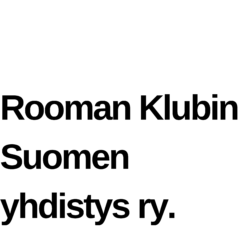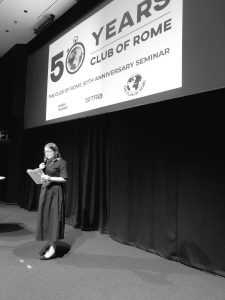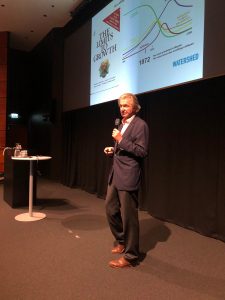On the 20th of September, The Finnish Association for the Club of Rome, together with the think tank Demos Helsinki and the Finnish Innovation Fund Sitra organized the 50th Anniversary Seminar of Club of Rome. The topic of the day was global challenges. The highlight of the event was the speech of the former president of Finland, a member of the club of Rome, Tarja Halonen.
A former co-president of the Club of Rome, Anders Wijkman, brought up that hundreds of years ago world was only a source of resources. Nowadays the situation is different: humans have had huge impact on nature. Today, 3% of the planet’s animals are wild animals, 30% are humans and 66% are farm animals. Additionally, climate is getting warmer and warmer. Regardless of the evidence of climate change, environmental catastrophes, overuse of resources, and maritime pollution, negligence about these topics is rising and global cooperation is weakening.
President Halonen reminded that hundred years ago Finland was the poorest one of the Nordic countries. However, the previous generations managed to build the welfare model and for instance its appreciated education system. President Halonen reminded Finns of the forthcoming parliamentary elections and encouraged people to use their power to vote and to affect on the new parliament and, thus, the state-level politics. The previous generations built better living conditions for the future generations, so can we. The politics is one way to influence. Executive director of Demos Helsinki, Juha Leppänen, took part in the discussion and argued that the next government should make the SDGs a basic framework for the next government programme. Additionally, to get to the SDGs, Finland should commit to long-term decisions beyond 4 years and ensure policy coherence as the SDGs are overlapping several administrative sectors. See the presentation of president Halonen here. Club of Rome 50th Anniversary Event_Halonen
Futurist Markku Wilenius brought up signs of systemic disruption: extreme temperatures and nature catastrophes happening in different regions of the world. Previously, business has been important but now times are fundamentally different than before. However, the problem is not that there are no evidence, information, or solutions, but if it is acted based on these. Wilenius argues that lack of indicators is not the reason not to act, vice versa. Actually, that is the right direction to go.
Economist Mika Kuismanen brought the viewpoint of the companies to the discussion. Kuismanen pointed out that climate change can be seen as a risk to the business. However, climate change is not like other risks: it has comprehensive impacts on the environment and the business. There is also tragedy of the horizon: the effects of climate change are seen later but the investments should be done now. This is the problem in the discussion in economics. Kuismanen called for practical outcome: business sector may want to make a change but the political battle between right and left wings may stop change from happening. Kuismanen stated for more and better regulation. Ordinary citizen should not be the one who bears the risk. Externalities should be prized and risks should be evaluated by financing and insurance community.
Speakers sent a strong message: we need a new model. Present societal systems cannot respond to the challenges of today. According to the speakers, what we need to do is:
1. Legislate carbon laws
2. Shift focus from economic growth to improving wellbeing
3. Move from linear economy to circular economy
4. Vote for like-minded people
After all the worry expressed and statements made, Kari Herlevi from Sitra reminded the audience that Finland is forerunner in circular economy in global level. Finland was the first country that launched its circular economy roadmap and in the future Finland can show the road for others too. Although there is a lot to do for systemic change to happen, Finland is on the right path. Herlevi ended the seminar by reminding that everyone is the decision-maker of his/her life. See the presentation of Kari Herlevi here. Club of Rome_Herlevi_20-9



